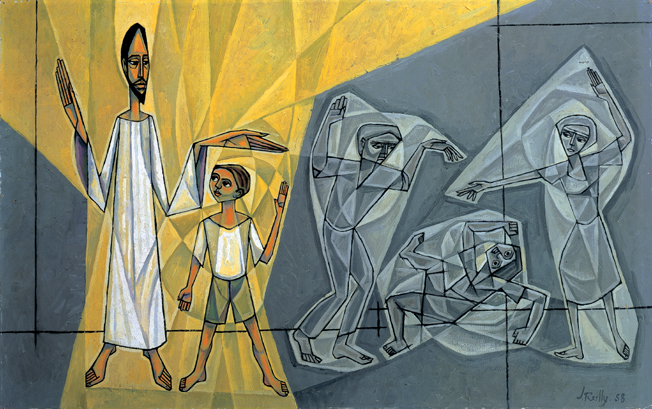
The search for the historical Jesus makes interesting reading. It is a problem, though, when it is undertaken with a competitive notion of God in the background. Humanity and divinity will compete within Jesus and his ministry. The more human we make Jesus (the liberals), the less room there is for an incarnate God. The more we want Jesus to be God-directed (the conservatives), the less human Jesus becomes. Liberals say the conservatives are docetists, and the conservatives call the liberals adoptionists. Liberals evacuate his ministry of supernaturalism and the conservatives try to find bits of his ministry that prove his divinity. Both have a competitive understanding of God; a God whose essence is defined over-against the rest of us. We must remember that because God is transcendent there is not a competition between creation and divinity. Jesus can be fully human and fully divine. Jesus can be truly human and have God as his source, which is just to say what the ancients have said before us in affirming the Word's assumption of his humanity. And because of this assumption by the transcendent God, we are not to look for bits of Jesus' ministry that prove his divinity, or divide his ministry between those parts that are divine and those that are human. He acts always as the incarnation of the Word. The divinity of Christ is invisible, by which I mean that it is the human Jesus we see. But his divinity is discerned invisibly in his human acts, not alongside them or behind them. In other words, Jesus is indivisibly human and divine in such a way that he is God in the flesh, not God behind the flesh.
Feeling the need to choose between a fully human Jesus or a divine figure is an example of the problem affecting so much contemporary theology and the reaction against it, and partially explains the great divide between liberal and conservative theology. And surprisingly, the liberals and conservatives are closer than they think, at least in their common foundational theological error.
his divinity is discerned invisibly in his human acts
ReplyDeleteIf the human acts (eg being incarnate, and healing and miracles, and indeed being resurrected) are visible then why do you say that Christ's divinity is invisible.
I don't think you can just suggest that the 'divinity' is invisible but its consequences are visible. That would be to deny the incarnational principle, wouldn't it?
I know we once had a conversation about Kenotic Theory (but can't remember what you told me I had got wrong...or what had been disproved by modern scholarship!)...it seems to me that there is something more being said about our humanity when we read that "he emptied himself" and yet is still able to do what we so often label as divine.(healing and stuff)
Is Christ raised in his humanity and/or divinity?
I can see that this has difficulties, any way I think your general thrust is interesting.
Is not
I mean that his divinity is not alongside his humanity. So I am disagreeing with those who try to divide Jesus up, either in his being or in his ministry. In the transfiguration, for example, it is not his divinity over against his humanity that is seen, but it is deified humanity. In Jesus of Nazareth the disciples were encountering the fullest expression of divinity that humanity could carry, so in this sense the divinity is invisible. But, I do not mean by this that his divinity is behind the humanity, but rather that we see the invisible God in his humanity. The Word became flesh. I'll follow this up next week with a post.
ReplyDeleteThen that's OK!
ReplyDelete